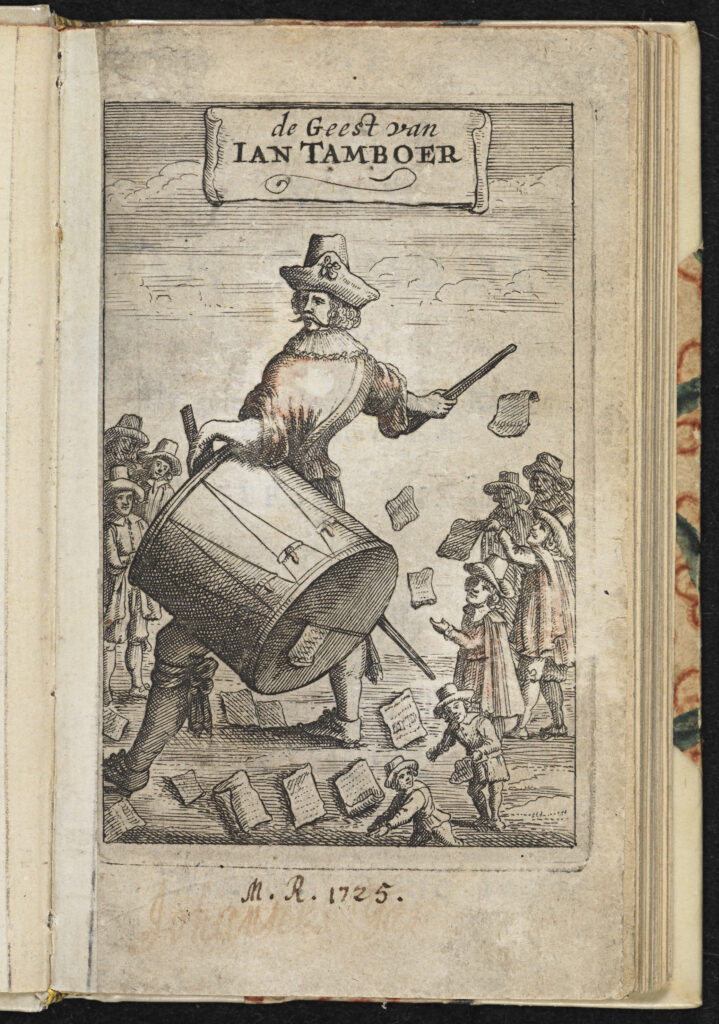Glossary
Jestbook

Other languages
- Dutch: kluchtboek, anekdotenbundel, moppenboek
- French: livre de propos, facéties, livre facétieux, bigarrure, dialogue joyeux, demande joyeuse (titles often include ‘joyeux’)
- German: Schwankbuch, Schwanksammlung
- Italian: barzellette, facezie, novella
- Polish: facecje, fraszki (specific form: literatura sowiźrzalska/sowizdrzalska = Owlglass literature)
- Spanish: chistes y agudezas
Material form
Printed bookSubject
Games and humour, Music and performative literatureDescription
Jestbooks are collections of jokes and humorous anecdotes in book form. A joke is a humorous piece of (oral) literature in which the funniness culminates in the final sentence, called the punchline. Whereas modern jokes tend to be short and rid of all superfluous narrative, early modern printed jokes or jests, despite the popularity of shorter witticisms, tended to be rather long narratives. There is some regional variety however, as Dutch jestbooks tended to be somewhat shorter. The main characteristic remains that the tension should reach its highest level at the very end, thus finishing with a climax instead of denouement. As for its being “oral”, although the jokes appeared printed, they were often transmitted further by means of speech, where there was no obligation to reproduce the text verbatim, as in the case of poetry. In the heyday of the genre during the 17th century, the jestbook was indeed considered not only an autonomous form of literature, but oftentimes also functioned as an aid for oral culture as well as theatre. While jests were often published in the form of a compilation of jokes, there have been a few instances where they were taken up in verse form. The jests contained in such books were often of an erotic or scatological nature.
Related (sub-)genres were the anecdotes and facetiae. Where the former were jests related to a (supposed) historical tale and ending with a moral of sorts, the latter were jests that revolved around a pun.
In French, Italian, and Spanish, there is no single term, nor a clearly defined genre of jestbooks. Facéties (French) or facezie (Italian) were a popular type of comical book. In France, there were for example comical dialogues, rebuses, question-and-answer texts, parodic texts, bigarrures (initially a title – Étienne Tabourot, Les bigarrures, 1583 – which grew into a genre indication; they contain puns, witticisms, acrostics, etc.), and physiologies (comical stereotypes of groups and professions, with illustrations, especially popular in the 19th century). Italian barzellette are short jokes.
Related terms
jokes, anecdotes
Sources
J. Bolte, ‘Zur Schwankliteratur des 16. und 17. Jahrhunderts’, Tijdschrift voor Nederlandse Taal- en Letterkunde 39 (1920), 75-96.
J. Bremmer and H. Roodenburg (eds.), A Cultural History of Humour: From Antiquity to the Present Day (Cambridge: Polity, 1997).
M. Chevalier, Cuentecillos tradicionales en la España del Siglo de Oro (Madrid: Gredos, 1975).
J. Crawford, ‘Oral Culture and Popular Print’, in: J. Raymond (ed.), The Oxford History of Popular Print Culture, Vol. 1 (Oxford: Oxford University Press, 2011), 114-129.
Project Facéties, L’Observatoire de la vie littéraire (OBVIL), Université Paris-Sorbonne, https://github.com/OBVIL/faceties (accessed 4 April 2023).
B. Gotzkowsky, “Volksbücher”. Prosaromane, Renaissancenovellen, Versdichtungen und Schwankbücher: Bibliographie der deutschen Drucke (Baden-Baden: V. Koerner, 1991).
R. Hetzron, ‘On the Structure of Punchlines’, in: Humor: International Journal of Humor Research 4:1 (1991), 61-108.
J. Koopmans, P. Verhuyck, Een kijk op anekdotencollecties in de zeventiende eeuw (Amsterdam/Atlanta, GA: Rodopi, 1991).
G. Legman, Rationale of the Dirty Joke. An Analysis of Sexual Humor (New York: Grove Press, 1968).
A. McRae, ‘Manuscript Culture and Popular Print’, in: J. Raymond (ed.), The Oxford History of Popular Print Culture, Vol. 1 (Oxford: Oxford University Press, 2011), 130-140.
Ian Munro and Anne Lake Prescott, ‘Jest Books’, The Oxford Handbook of English Prose 1500-1640, ed. Andrew Hadfield (Oxford: Oxford University Press, 2013), 343-359
P.P. Schmidt, Zeventiende-eeuwse kluchtboeken uit de Nederlanden (Utrecht: HES Uitgevers, 1986).
J. Verberckmoes, Laughter, Jestbooks and Society in the Spanish Netherlands (Houndmills: MacMillan Press, 1999).

